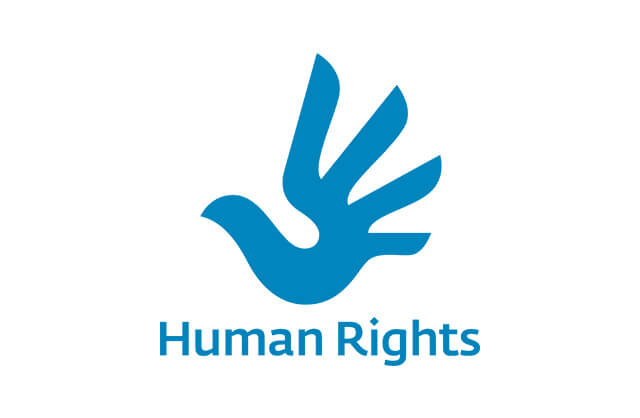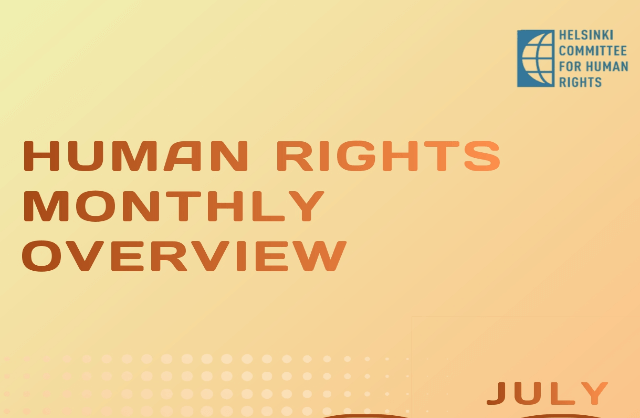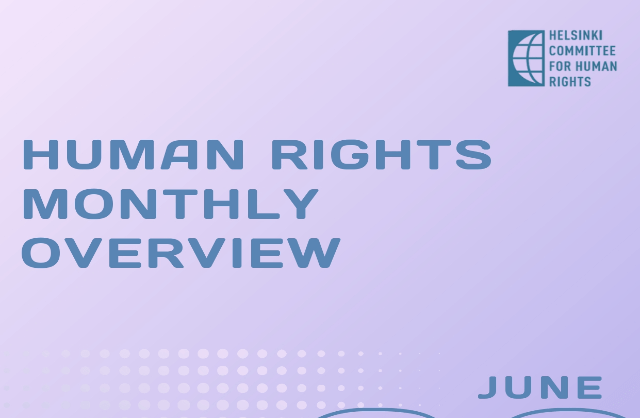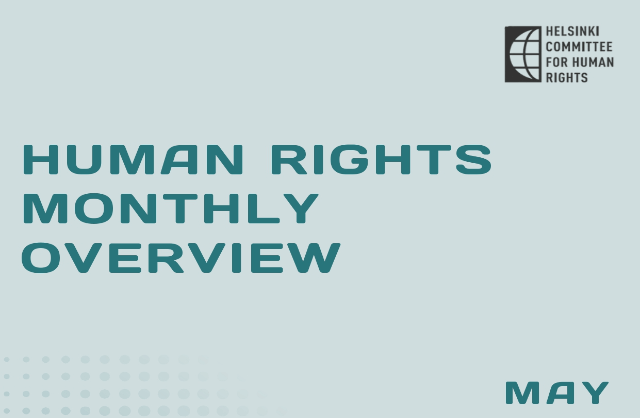Monthly Report- November 2015
December 14, 2015

The Monthly report on the human rights situation in the Republic of Macedonia for November 2015 includes the following topics: Special Public Prosecutor’s Office Finally Began their Work; Administrative Courts above the European Court of Human Rights; Violation of the Right to Trial Within a Reasonable Time; The Kriva Palanka Case; Attacks on Roma Children Must Be Investigated and Sanctioned.
SPECIAL PUBLIC PROSECUTOR’S OFFICE FINALLY BEGAN THEIR WORK
During the month of November, the Special Public Prosecutor’s Office submitted a request for obtaining the established cases associated with the interception of communications to the Public Prosecutor’s Office for Organized Crime and Corruption and the Basic Public Prosecutors in Skopje, Bitola and Kumanovo. The requested cases were delivered by all prosecutions, except by the Basic Public Prosecutor’s Office Kumanovo, for which there’s no information on whether or when they received the request and whether they have violated the legal deadline of 8 days for delivering the case.
From the received cases, the Special Public Prosecutor’s Office established jurisdiction only for cases related to election irregularities, which are in pre-trial proceedings. For the case “Puch”, which was submitted to Special Public Prosecutor without an appropriate request, no decision has been made yet on whether this prosecution has the actual competence to lead the case. Considering that this is the only case for which detainees are kept in detention for more than 10 months, we believe that the Special Public Prosecutor’s Office should decide on the jurisdiction of this case as soon as possible.
A positive fact is that 12 public prosecutors which are to be part of the team of the Special Public Prosecutor’s Office were elected, but they still do not have a team of investigators, no legal assistants or administrative service, which is stipulated in Article 2 paragraph 3 of the Law on Public Prosecutor’s Office for prosecution of crimes arising from the content of the illegal interception of communications. This contributes to the current inefficiency of the Special Public Prosecutor’s Office.
RECOMMENDATION:
The Special Public Prosecutor’s Office should make a decision for overtaking the case publicly known as “Puch” as soon as possible.
A law on public prosecutor’s office administration should be enacted as soon as possible for the election of investigators, legal assistants and an administrative service.
ADMINISTRATIVE COURTS ABOVE THE EUROPEAN COURT OF HUMAN RIGHTS
The Helsinki Committee followed the court proceedings for the expropriation of property owned by the Arsovski family from Kratovo which have been running at the European Court of Human Rights (ECtHR) since 2002. The family property was expropriated upon the proposal by a private company which obtained a water extraction licence from below the property. In 2009, the possibility for private companies to propose expropriation of private property as an issue of public interest was regarded as contrary to the Constitution of the Republic of Macedonia by the Constitutional Court (U. no. 200/ 2007) because of the possibility to confiscate properties in favor of economically powerful recipients, while the interest of the owners that hold the right of possession is minimized and calls into question the constitutionally guaranteed right of possession.
After the expropriation proceedings before the domestic courts ended in 2005 with the seizure of property by the state in favor of the private company, the Arsovski family Arsovski received a compensation of 880 euros without considering the private company’s profits from the water extraction. Dissatisfied with such a decision by the domestic courts, the Arsovski family in 2006 filed a complaint with the ECtHR in 2006.
In 2013, the ECtHR delivered the judgment no. 30206/06 (Arsovski v. Macedonia) which found that the state had violated the right to property guaranteed by the European Convention on Human Rights (ECHR). In addition, ECtHR granted the appellants a sum of 9,000 euros paid by the state for intangible costs, while the proceedings for material costs were stopped, but not finished, in the expectation that the Judgment will be used for re-opening of the proceedings before the domestic courts with the purpose of recovering the property or an equitable expropriation.
After receiving the judgment in 2013, the Arsovski family requested a retrial before the competent Administrative Court which upheld the request and annulled the former valid decision on expropriation (U-2 no. 494/13). During 2014, the company Sileks Kratovo joined the proceedings as an interested party that appealed to the Supreme Administrative Court, which upheld the appeal and ordered the Administrative Court to decide on the request for a retrial anew (Would-1 no. 297 / 14). The Supreme Administrative Court, among other things, stated that “For this Court, it is undisputed that after the decision of the ECtHR upon the request for change of the delivered judgment, is obliged to act after that request, but it will decide whether to allow a re-trial depending on the reasons for request of a re-trial.”
After a second decision for reopening of the proceedings before the Administrative Court in 2014, the Court issued a Decision with which the Arsovski family’s request was dismissed as untimely and inadmissible (U-2 no. 1278/14). According to the Administrative Court and pursuant to Article 47 paragraph 2 of the Law on Administrative Disputes, the proceedings for the present case may not be subject to reopening because 5 years had passed from the implementation of the decision for expropriation in 2005. The decision of the Administrative Court was confirmed by the decision of the Supreme Administrative Court in 2015 (U-1 no. 199/2015).
The Helsinki Committee expresses its concern over this decision of the Administrative and Supreme Administrative Court. Namely, although it is true that the repetition of the administrative proceedings under the Law on Administrative Disputes is possible within 5 years from the date of the disputed legal act, the administrative courts overlooked that, pursuant to Article 118 of the Constitution of the Republic of Macedonia, international agreements ratified in accordance with the Constitution are part of the internal legal order and cannot be changed by law. In practice, this means that the authority of the ECtHR is above the legal force of domestic laws and that in a situation of conflict between domestic and international law, the state authorities must comply with the provisions of the international law.
RECOMMENDATION:
The provisions relating to the limitation period established by the provisions regarding the criminal and civil proceedings and the Law on Administrative Disputes should be amended in a way that deadlines for the start of limitation shall run from the date the judgment of the ECtHR, and not from the validity of the final act before domestic courts.
VIOLATION OF THE RIGHT TO TRIAL WITHIN A REASONABLE TIME
The Helsinki Committee has yet again established a violation of the right to trial within a reasonable time in a court procedure for annulment of a decision for termination of employment. The particular case involves a person who as a prosecutor led a lawsuit for 3.5 years to annul the decision for termination of employment at a penitentiary. During the period of 3.5 years, the Basic Court Skopje 2 annulled the contested decision once, but since this judgment was quashed by the Appellate Court Skopje, a negative judgment was delivered for the plaintiff, which was subsequently upheld by the secondary court.
The primary court needed 1 year and 7 months to deliver the first judgment, which is in breach of Article 405, paragraph 4 of the Law on Litigation Procedure which stipulates that proceedings upon labor relation disputes before the primary court have to be completed in a period of six months as of the day of filing the lawsuit.
However, the secondary court acted on the complaint of the plaintiff for more than 1 year and 2 months, which is contrary to Article 405, paragraph 5 of the Law on Litigation Procedure which stipulates that in proceedings on labor relation disputes in а secondary court shall be completed in a period of 30 days as of the day of the receipt of the appeal, i.e. in a period of two months if the hearing is held at the secondary court. In this particular case, a public hearing was not held, which means that the secondary court had exceeded the time limit for a decision by 1 year and 1 month.
Because of the apparent violation of the right to trial within a reasonable time, the plaintiff filed a request for protection of this right to the Supreme Court of the Republic of Macedonia referring to the national legislation and the provisions of the European Convention on Human Rights and the practice of the European Court of Human Rights. Article 6 of the European Convention on Human Rights states that “everyone is entitled to a fair and public hearing within a reasonable time by an independent and impartial tribunal established by law which will review and determine the rights and obligations”. Acting under the Convention, the European Court of Human Rights has revealed a violation of the right to trial within a reasonable time by emphasizing the importance of implementing justice without delays which might jeopardize its effectiveness and credibility.
RECOMMENDATION:
On many occasions, The Helsinki Committee has reminded of the importance of efficiency of judicial proceedings as well as criminal, civil, and administrative proceedings, recommending to respect the right to trial within a reasonable time, so that citizens can promptly exercise their rights.
THE KRIVA PALANKA CASE
In the beginning of November, a poster calling for a “Protest against Islamization of Kriva Palanka” was being shared on the Facebook network. Apart from the text which gave the time and place of the protest, there were five pictures on the bottom of the poster with crossed out Islamic religious objects and mosques. The poster was preceded by the citizens’ initiative for collecting signatures in order to prevent the construction of a mosque in Kriva Palanka. The initiative, however, came as a result of the construction of an Orthodox church in the city center and the discriminatory speech held by the mayor, who said that while he was in office, only Orthodox religious sites would be built. 1,200 people attended the scheduled protest. Representatives of the Helsinki Committee monitored the protest which took place in a relatively calm atmosphere, except for the chants containing hate speech that was promptly prevented and controlled by the organizers. However, later in the night, a group of unidentified persons demolished the adjusted object for prayers of the Muslim community in Kriva Palanka. The event was recorded by the police and investigative measures for clearing the case were taken.[1]
The hate speech platform, which is a part of the Helsinki Committee, published a reaction that strictly condemned the hate speech used in the poster which encourages and spreads hatred and intolerance on religious grounds.[2]
We must mention that in accordance with the Constitution of the republic of Macedonia, citizens are equal in their freedoms and rights regardless of sex, race, color, national or social origin, political and religious beliefs, property and social status. At the same time, Article 19 of the Constitution guarantees freedom of religion and freedom of religious practice and religious traditions of all religious communities in the Republic of Macedonia. In addition, causing and spreading hatred, discord or intolerance on religious grounds is a criminal offense as stipulated in Article 319 of the Criminal Code of the Republic of Macedonia.
As for the sharing of the poster containing hate speech, the Helsinki Committee filed a motion to the Ministry of Interior – the Department of Computer Crime and Digital Forensics requesting the event to be investigated in order to prevent further spread of hate speech on the social network Facebook and its escalation in hate crimes.[3] After the Ministry of Interior’s statement that the police inspected and investigated the event, the Helsinki Committee expects that the competent institutions will find the perpetrators and they will be sanctioned accordingly. For that purpose, we requested information from the Ministry of Interior about the outcome of the investigation.
RECOMMENDATION:
The Helsinki Committee warns that it is necessary for authorities to take appropriate measures for preventing hate speech and hate writings; to actively monitor reported cases of hate speech and to prevent its escalation in hate crimes; to find the perpetrators of hate crimes through prompt and effective investigation, bring them before court and sanction them accordingly for the crime they have committed.
ATTACKS ON ROMA CHILDREN MUST BE INVESTIGATED AND SANCTIONED
The Helsinki Committee and the members of the Network for Protection against Discrimination have recently received an increasing number of reports of attacks on children from the Roma community by owners or employees of catering facilities.
The last event occurred at the bakery “SILBO” in the center of Skopje. Namely, according to eyewitnesses, the child was harassed and kicked because he allegedly demanded money from the customers at the bakery. A witness reported the event to the police, who quickly arrived at the bakery and took statements from persons who allegedly committed the crime and the witness who reported the event.
We believe that these actions are in fact criminal actions because the group harassed, physically hurt the child and thus endangered the safety of the child. Having in mind that the crime was committed in a public space – before the restaurant in the center of Skopje and in front of a number of people and others guests in the building, it can be concluded that the perpetrators of these acts had caused a feeling of insecurity, threat, and fear among others present.
Given that the victim of the crime is a child of Roma ethnicity who belongs to a marginalized community, and the actions of the perpetrators that violate the rights of victims are directed at the Roma ethnicity children as a whole, the perpetrators with their actions committed discrimination based on ethnicity and belonging to a marginalized community.
RECOMMENDATIONS:
Since this is not the first reported case, we believe that the Ministry of Interior and the Public Prosecutor’s Office should work for an immediate clarification of the case and take appropriate actions for initiating criminal proceedings against suspects with the aim of punishing them and preventing future attacks on Roma children.
Regarding the actions taken by the competent institutions, we request that the Convention on the Rights of the Child be taken into account since it states that public authorities must take all appropriate measures to protect the child from all forms of physical or mental violence, injuries, and harassment, as well as the practice of the European Court of Human rights, particularly the case Bekos and Koutropoulos v. Greece, which stipulates that violation of the prohibition of discrimination will be considered a failure or inability of state authorities to investigate whether a particular case is based on racism, i.e. racial discrimination.


